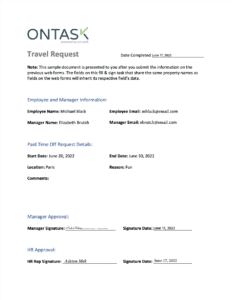As a legal professional, you’re likely all too familiar with the many-layered complexities of managing workflows.
Larger legal departments or teams may rely on a combination of personnel, manual administration, analog systems, and software solutions. But even a small firm’s workflow is incredibly complex. Any team’s daily work connects to a myriad of crucial things, including:
- HIPAA, FERPA, SOC 2, & CCPA compliance
- Client onboarding
- Document generation and signing
- Project & matter management
- Secure document storage and retrieval
- Finance and pricing considerations
- Payment systems and anti-money laundering (AML) compliance
A legal department or firm needs the right tools for its case management system to be truly effective. These days, that increasingly entails legal workflow automation software that integrates and complements your chosen CRM. But what is it? What are its benefits, and what should you look for in a solution? Let’s dig into it.
What is Legal Workflow Automation?
Put simply, legal workflow automation means taking repeatable tasks and making them automatic. In the context of a legal practice, this looks like automating necessary tasks that take up as much as 40 percent of legal professionals’ time. Lawyers can spend more time practicing law by centralizing and automating important steps like:
- Client communication (such as requesting contract signatures)
- Generating standard legal documents
- Tracking task progress
- Managing matters and projects
- Assigning workflow tasks based on project stage
Why is Workflow Automation Important For Legal Teams?
Law practices that don’t invest in automating their workflow can end up bogged down in administrative work. This can result in less time practicing law, which Thompson-Reuters estimated at only 60 percent of small firms’ work time in 2020.
Their teams are also likely to miss crucial information that could affect legal matter outcomes, firm success, and even regulatory compliance. What happens if a crucial piece of court evidence gets lost because of an overly manual and non-integrated communication system with clients?
Beyond this, teams that are too mired in repetitive work suffer from plunging morale. This can negatively impact work quality, lead to burnout, and ultimately increase turnover. With exhausted legal teams, a practice’s clientele is likely to suffer as well.
Legal workflow automation can dramatically improve all of these outcomes. Let’s explore how.
6 Key Benefits of Legal Workflow Automation

Automating the legal workflow offers several key benefits to legal teams.
1. Increases Efficiency
Most mind-numbing administrative legal tasks are repeatable to at least some degree. Completing these tasks manually is tragically inefficient. For example, a specific type of legal matter probably involves similar documents over time, even if some of the specifics change. Yet legal teams may draft these documents from scratch for each project. But imagine automatically generating matter-specific document templates, only inputting the details that change.
How might your team’s use of time change as a result? You can compound that increase in efficiency by automating every repeatable task your team faces.
2. Improves Accuracy & Consistency
Automating repeatable tasks makes the process more consistent, and software that centralizes the entire workflow does this most effectively. When you centralize your workflow management end-to-end, key information is consistently where it needs to be, when it needs to be there. This means you can find that key piece of evidence when you need it, see who needs to complete the next project task, automatically message clients at the right time, stay within budget, and so much more. Nothing falls through the cracks, and you mitigate unnecessary human error.
3. Creates Better Collaboration
Through automation, law firms can delegate to the right team members seamlessly, moving the ball forward in real-time as each task is completed. Since everyone can access the platform, progress is less likely to stall because someone missed an important request.
Being able to automatically track task progress – and see how your work advances a common goal – further motivates teams to collaborate. And if a problem comes up, troubleshooting is also easier.
4. Ensures Regulatory Compliance
If the way your firm managed a specific case, piece of evidence, or suspicious activity is called into question, it’s crucial to be able to refer back to salient details, timelines, and documents. Automating and centralizing the entire workflow creates a reliable paper trail in case of an audit or investigation.
By investing in a tool that is HIPAA, FERPA, SOC 2, & CCPA compliant, you can also demonstrate that sensitive client information is handled ethically.
5. Cost Savings
Law firms rightly consider the upfront cost of investing in a new automation solution. But this is best done in context of a more holistic return on investment (ROI) calculation. We recommend a firm quantify their use of time and resources in terms of cost, noting places where cost increases because of inefficiency. Then calculate how much automation might mitigate some of these costs. Even though the upfront spend might seem higher at first glance, the improvement in resource use through automation often works out to a net ROI-positive investment.
6. Superior Client Experience
When firms have streamlined, efficient tools that ensure clear communication and dependable access to key information, client experience improves. Effective legal workflow management tools should include eSignature technology to further streamline paperwork management. Automation addresses many factors that can work to frustrate clients, such as:
- Lagging timelines
- Miscommunication
- An inability to understand the big picture
- Confusion over who a task is waiting on
- Concerns over the security of personal information
What Features Should Legal Workflow Management Software Have?
How can firms be sure their chosen tool offers these important benefits? Start by looking for several key features.
Integrations
A workflow management tool must integrate with a law firm’s wider functions to be effective. Teams need access to holistic information, including comprehensive matter history, firm finances, and key resources for legal research. It also helps to be able to integrate key tools you already use. Look for a tool that can integrate tools via API and access key data using webhooks.
Reporting and Analytics
Firm-wide productivity and ROI can dramatically improve if workflow solutions synthesize important information like timelines, matter progress, productivity, and financial statistics. Being able to see these things in one place can ensure the whole firm makes data-driven decisions. So consider tools that offer document analytics and team reporting, and even AI-enhanced data extraction and parsing.
Automated Workflows & Task Management
A good legal workflow management solution should automatically move a matter along to the next assigned person and task, send pre-designed emails at the right time, and generate timely reminders depending on a project stage.
The platform should also be able to automate every repeatable process across your entire workflow – from client onboarding to report generation.
Document Management
A dependable solution should be able to centrally and securely store and organize documents. Look for a platform with reliable search and retrieval functions, high-security standards, and clear access to previous document versions. Signing documents should also be automated.
Also, consider whether your legal workflow management platform offers customizable templates and automated signing to simplify your process.
Collaboration Tools
Does your existing or prospective tool offer streamlined communication between colleagues integrated into the entire workflow? Can it not only facilitate messages between colleagues and clients but also offer team document collaboration? A good solution should offer things like collaborative document edits, comments, signatures, and approvals alongside integrated task management and centralized messaging.
Time and Expense Tracking
Rather than relying on manual time tracking, consider a tool that can automatically start and stop a time tracker at the beginning of a calendar event. Also look for the ability to set up an appointment workflow and send time-based emails and reminders to clients.
A good solution should also be able to automate expense approvals and generate expense reports based on integrated or centralized data.
Security and Compliance
Look for a solution that can store protected information in compliance with HIPAA, FERPA, SOC 2, and CCPA requirements. As we discussed above, it should also provide a clear paper trail and analytics so that if the firm’s processes are challenged, everything is clearly documented and in one place.
Customizability
Each law firm has its own specialties, obligations, and client requirements. Even within the same firm, a workflow type may evolve over time or between projects. An automation tool should offer control over what you automate and how. You should easily be able to create unique workflows and documents depending on your needs.
Docubee: Your Legal Workflow Management Solution
Here are a few common scenarios where a legal workflow automation tool like Docubee might improve firms’ day-to-day operations.
Matter Management
A flexible workflow solution can help firms tailor their legal project management (LPM) to the matters they regularly deal with. This means custom documents and workflows can be generated based on different matters. Meanwhile, centralized information makes it easy to consult matter precedents when making crucial decisions.
Contract Management
By generating custom contracts, centralizing team document collaboration, and automating signatures, the contract management process can fly smoothly. No more recreating documents from scratch, losing important evidence, or missing crucial client communication.
Document Review and Discovery
Send documents to stakeholders for seamless collaborative editing, redlining, and comments in real-time. Docubee’s solution features a Word-like text editor for peak ease of use, too. And since all the documents are stored in one central platform, they’re easy to look up again when needed.
Billing and Invoicing
Firms can automate their time tracking, automatically generating bills or invoices for their customers based on bespoke templates. Even the process of reviewing, editing, and approving invoices before sending them out can be automated, alongside payment reminders.
Firms looking to simplify their workflow management will find a holistic, streamlined solution in Docubee’s legal automation platform. From centralized document generation and collaboration to whole-team task management, your firm’s efficiency can fly to new heights. Ready to learn more? Book your demo now.











